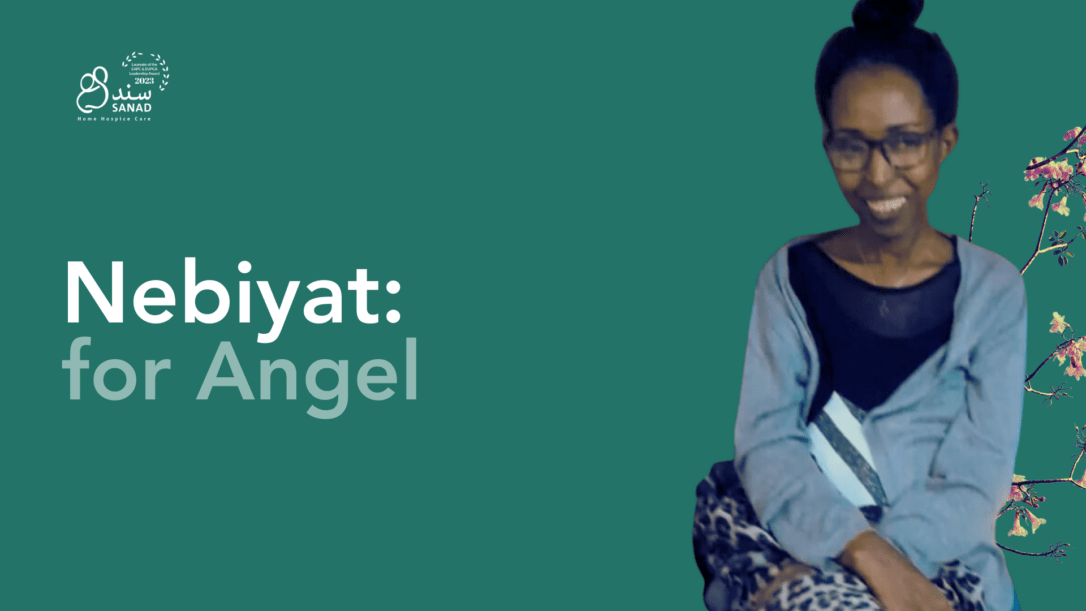In an almost picturesque home in the heart of Beirut, we passed through canopies of trees and roses to meet ‘Monica’, SANAD’s patient.
‘Monica’ (her common name in Lebanon) has been with SANAD for a short period of time, diagnosed with end stage pancreatic cancer and given a prognosis of less than a year. She resides with her husband, Ghassan, who is her main caregiver.
We ask her about her birth name, Nebiyat.
“It’s Ethiopian for angel.”
“That name suits you well”, we comment.
A wide, warm smile blossoms on her kind face, affirming our remark.
SANAD’s nurse, Hamsa, starts her routine check with Nebiyat.
She checks her vitals, she asks about her sleep, her daily routine, and whether she is experiencing any pain or nausea. She also asks about her bathroom habits, how her appetite is doing, and upon observing her swollen feet, whether she feels like a walker might help her move around easier.
“I don’t think I need one right now”, Nebiyat says softly, “but when I do become in need of it, I wouldn’t mind using it. I am not ashamed to walk with a walker or a stick”, she adds.
That’s the thing about Nebiyat, the thing that is virtually impossible not to notice:
she has a powerful and magnetic sense of self. She is comfortable in her own skin, regardless of the disease or whatever happens. Her strong sense of identity pulls us in, and we start working on unfolding the layers that make her so unique.
“Who is Nebiyat?” we ask her as we move closer to her side.
“Nebiyat is the one with the kind heart. She is the one always trying to help everyone, no matter what is happening with her.”
Her eyes twinkle with a tear or two, she carries on.
“I love going to the beach, I want to sit by the sea, I want to do that soon.
I read a lot, I love reading Ethiopian romantic novels” she asks her helper, Maqdis, to bring us her stack of books, which she proudly flaunts.
“Prayers keep me strong. My husband has been a huge support to me all this time."
Her husband had left us and went out to the garden for a bit, where Hamsa provided him with a new set of symptom management medication and guided him through them.
“I love him, I love everything about him.”
She starts to cry; we hold her hand.
“I don’t want to feel like I am burdening him with my illness. He had mentioned that he would do anything he could to care for me. I think it is because he is obliged to, because I am his wife.”
“Because you are his love.” We comment. “You do realize that caring for someone you love is something that gives a person joy?”
She ponders for a bit.
“I don’t like to tire people.” She says after nodding.
When Ghassan entered back into the room, we made it a point to ask him about what his caring for her meant to him.
“She’s the love of my life. Of course, I will care for her and provide her with everything she needs.”
“Because you are obliged to?” we ask.
“Because it makes me happy.” He smiles, we smile, we look back at her, she is smiling, he kisses her forehead.
“When we first got the results from her doctor, she came to me and said “don’t be sad, but I only have about 6 months left to live with you””, Ghassan remembered, fighting back tears.
“I was the first one to learn about my cancer” she adds, “after several rounds of treatment that I felt were doing nothing to help, I chose to stop and just embrace what was coming.”
“I asked Ghassan not to hide anything from me. I want to know everything that is going on, it’s my right, it’s every patient’s right.”
The coffee is ready. Maqdis places the tray on the coffee table in the middle of the room.
Nebiyat then asks her to bring it closer to her, so she could pour us the coffee by herself, as she rests in her seat.
There is no doubt about it; she is the host, the lady of the house.
The fact that she is terminally-ill, that she cannot move well, or that her hands are shaky as she pours the coffee in the cups felt like minor details in contrast with her elegance, poise, and confidence.
It is really a breath of fresh air, a marvelous sight to witness.
A patient is a person whose identity should not fade away with the illness, neither should his routines, habits, or dreams.
We drink the coffee and thank her for having us.
“Hamsa is an angel.”
She says as we stand up to leave.
You might say, they were able to recognize each other.
She slowly gets up to accompany us to the door, despite our reassurance that she does not need to.
She insists.
As we all walk out to the garden, we ask about the plans for the weekend.
“How about the beach?” we suggest to Ghassan.
We look back at her, she smiles as the sun hits her face.
An angelic sight.

